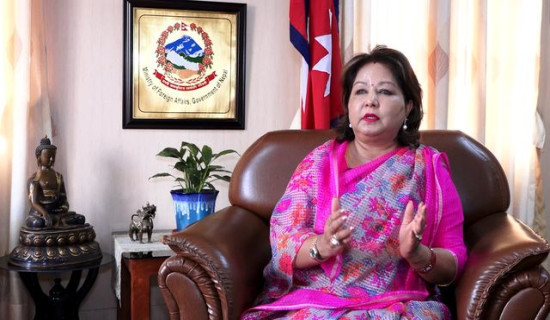- Saturday, 10 May 2025
Gold Laying Goose Gets Jumpy
Super gold pilers and vaulters eye each other with suspicion, as trust between them erodes gradually. Several African governments have withdrawn their stock of gold from the United States. This could have a domino effect. Afghanistan’s gold worth $9.5 billion reportedly remains frozen in US bank vaults. In May, India reportedly repatriated 100 tonnes of its gold from the United Kingdom. Half of its 800-plus tonnes of the yellow metal is in foreign vaults.
However, it might not be easy for a state to get its gold deposited overseas to transport it back home. In 2009, Germany wanted to clear its gold stock from US vaults. But the safe-keepers curtly informed that it would take seven years to do that. Why? Had the gold been used up by the safe-keeper? Four years after Germany’s central bank announced a decision to repatriate, the European Union’s largest economy was able to get hold of half of the 1,300 tonnes of the precious metal it deposited in the NATO’s most powerful and world’s richest nation.
Details of the remaining half of Germany’s gold is not disclosed. Berlin seems to have been advised not to make much fuss over repatriating the rest of its gold in any big bulk. Doubts and suspicions followed over such deposits abroad. Now the situation is different. There are fears that the vaults with yellow metal might be more empty than full. Speculation is rife that the deposits by the trusting friendly foreign governments are appropriated liberally by the host country to run the profitable weapons industry.
Trust erosion
The goose that had been laying gold bars regularly and in large volume for several decades is showing serious signs of poor health. All those promises of prompt delivery when asked might not produce the gold stocked in good faith as promptly as people might think. Absence of regular audit of the gold-laden vaults has set off the question: Are the vaults empty or have the hosts appropriated the contents for their own purposes?
The going’s good as long as it lasts. Once the test arrives, the actual taste of the product will be known. Credibility, once faltered, finds hard to stand on the stilts representing trust. Intriguing developments are occurring but intelligent responses are not forthcoming from the West. Some major powers are seen as big bullies, especially by an increasing number of leaders from the developing world. Matching measures can address the deficit and change perceptions in these times of changing world order. The manner in which economic and various other sanctions have been issued against individual states and leaders because of clash of interests has prompted governments to step up safety measures and manage fallback position for times of crisis.
At the same time, the growing line of argument that you-are-either-with-us-or-you-are-not-with-us creates compelling conditions for many governments to take sides. The outcome is not always pleasant. Alignments have consequences in different degrees. They attract countermeasures from the other side of the conflict.
After the Ukraine war erupted in February 2022, the US, European Union by and large and most NATO members together with their other close allies in different regions sanctioned Russia and its President Vladimir Putin. So much so that billionaires, tagged “oligarchs”, who were seen as being close to Putin and failed to condemn his action in Ukraine, were sanctioned, their property seized and bank accounts frozen.
Many analysts have begun admitting that sanctions on Russia were done in such hurry that the move sent off alarm bells in national and regional quarters. Some commentators, including this scribe, had warned of consequences that would unfold. Clearly, the mainstream West planned it all wrong. Russia has just emerged as Europe’s richest nation, despite the stringent sanctions its critics pressed for. Just about the time the new world order gave concrete signs of emerging, the sanctions have had boomeranging outcome.
The development has jolted many a country into stepping up caution and making strategic plans for coping with inclement eventualities, particularly those set off by others. Memories of past conflicts and turmoil are revisited for fresh look and lessons that might have been overlooked. History is always a good precept for what to do and what to avoid. There are many who attribute the brutal killing of Libya’s leader Muammar Gaddafi to the pan-African currency he advocated with great vigour. His oil policy did not comply with the core interests of the big powers in the West.
Desperate risks
In the 2020s, however, the growing size and strength of BRICS initiative constitutes a major challenge to the US and its close cousins that have been the superpower’s pillion riders in global economics-driven politics. The greenback risks losing significant ground, brick by brick, to BRICS, which is expected to expand with more members and energy in its summit scheduled for October.
The US is getting desperate in its bid to maintain the dominant position it commanded in the post-World War II decades. Will its European cousins go all the way to its support even in the changing global conditions? Will they faithfully fall in the line with the superpower on the other side of the Atlantic waters? Not all will oblige the US. Many will do so but with restraint while a few will back it tentatively in order to gauge unfolding events and risks entailed.
Seeking to stage a comeback in the presidential race next November, Donald Trump’s threat in May to punish countries seeking substitutes to the US dollar will invite a major confrontation, that is, if the former president does return to the White House and pursues the stated policy. One of the reasons for several African and West Asian countries to repatriate their gold from the US, the UK and France is the result of a tussle between the traditional big powers and a more assertive group of nations keen to chart their own independent course. Recent events point out that a strong national bias is not the preserve of a few but the right of all sovereign nations. No power need wince at the prospect.
(Professor Kharel specialises in political communication.)

















